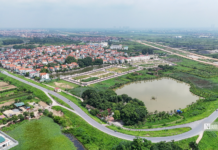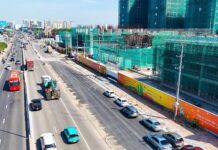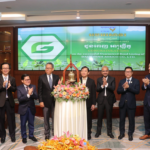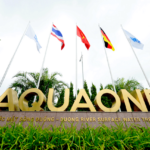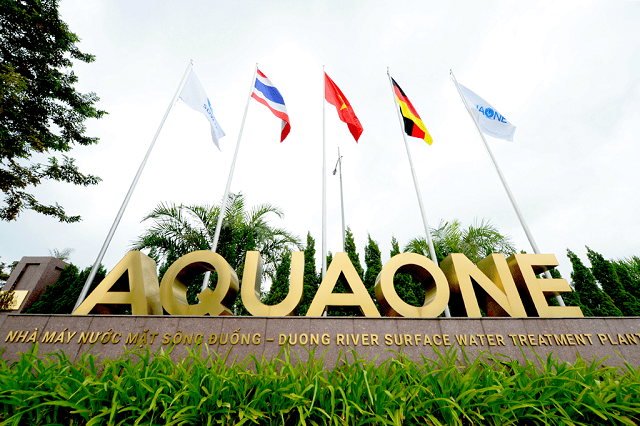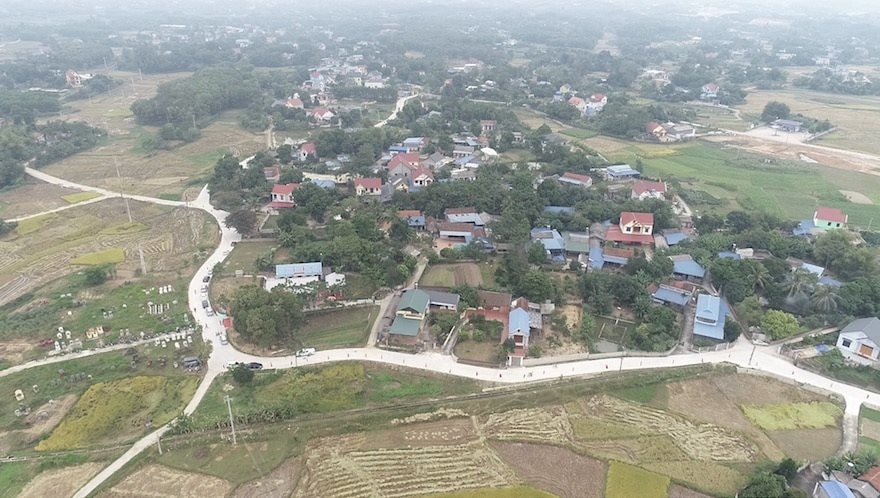
A rendering of the proposed urban area development project in Thai Nguyen province, Vietnam.
A joint venture between Hanoi Real Estate JSC (Hano-Vid) and AAC Vietnam JSC has recently published an environmental impact assessment report for their upcoming real estate project, Urban Area No. 1B, in Ba Xuyen ward, Song Cong city, Thai Nguyen province.
The project, spanning almost 32.5 hectares, received investment approval from the People’s Committee of Thai Nguyen province in April 2022 and finalized the investor approval process for the joint venture in July 2024.
Of the total project area, 15 hectares are currently used for rice cultivation, 1.7 hectares for residential purposes, and the remaining for transportation, greenery, and other purposes. The development will require land acquisition from 194 households.
The master plan includes allocating 8.8 hectares for residential buildings, 6.9 hectares for green spaces and sports facilities, and the rest for transportation and technical infrastructure. The project is expected to accommodate approximately 3,500 residents.
Urban Area No. 1B will feature 797 land plots, including 57 villas and 740 adjacent houses. Among these, 214 houses located along the Song Cong – Nui Coc axis will be constructed with an average building density of 80%, comprising 4-5 floors.
Additionally, the project will allocate 40 land plots for resettlement, along with land for social housing, adjacent resettlement houses, schools, temples, cultural centers, and commercial buildings.
Strategically located, the project borders the Song Cong River to the west, Vu Xuan Street (DT.262) to the east, and existing residential and agricultural areas to the north and south.
In terms of external transportation, the project is conveniently accessible via several major roads, including the 5th Ring Road of Hanoi Capital with a cross-section of 62.5 meters, DT.262 with a width of 19.5 meters, and the Song Cong – Nui Coc axis ranging from 22.5 to 36 meters in width.
As per the projected timeline, the project is expected to be completed by the fourth quarter of 2026, marking the end of the investment construction phase and the commencement of handing over the completed structures for use.
With a total investment of nearly VND 770 billion, the project allocates VND 170 billion for site clearance and resettlement expenses. In terms of capital structure, the investors’ equity contribution stands at VND 120 billion, with AAC Vietnam contributing 84% and Hano-Vid contributing the remaining 16%.
Hano-Vid, established in December 2010 with a charter capital of VND 771.5 billion, has a strong presence in the real estate sector. The company’s shareholder structure comprises three legal entities: Hanoi Textile and Garment JSC, Hanoi Textile and Garment Corporation (Hanosimex), and Vietnam Investment and Development Group (VID Group), the predecessor of TNR Holdings, now known as Rox Group, chaired by Ms. Nguyen Thi Nguyet Huong.
Hano-Vid has successfully developed notable projects such as the high-end apartment complex TNR Goldsilk Complex in Ha Dong district, Hanoi. Additionally, the company has been entrusted with several large-scale projects, including the Western Residential Area of Dong Mai Beer Factory in Quang Yen town, the Northern Residential Area of Pho Chau 1 in Huong Son district, Ha Tinh province, and residential projects in Phu Tho, Bac Kan, Thanh Hoa, Cao Bang, and Son La provinces.
Hano-Vid has also attracted attention in the financial market through its bond issuances. From July to November 2020, the company issued 180 bond lots, each valued at approximately VND 50 billion, raising a total of VND 8,700 billion. These bonds, with maturities ranging from 5 to 7 years, are mostly unsecured, and Vietnam Maritime Commercial Joint Stock Bank (MSB) serves as the custodian.
As of the first half of 2025, the company’s bond debt remained unchanged from the previous year, standing at nearly VND 9,544 billion. Hano-Vid’s total liabilities as of the second quarter of 2025 exceeded VND 21,899 billion, including the aforementioned bond debt, other liabilities of over VND 10,100 billion, and bank loans of VND 2,254 billion. Notably, the company’s debt-to-equity ratio stood at 4.14, indicating a relatively low equity level of VND 5,295 billion.
In the first half of 2025, Hano-Vid recorded a net profit of nearly VND 9.7 billion, a significant increase of 360% compared to the same period last year.
Turning to the other member of the joint venture, AAC Vietnam JSC, the company was established in 2007 and specializes in real estate development. As of May 2024, its charter capital stood at over VND 600 billion. Ms. Vu Thi Tien Lu (born in 1980) is the General Director and legal representative of AAC Vietnam.
Beyond their collaboration on Urban Area No. 1B, AAC Vietnam and Hano-Vid have partnered on other real estate ventures. Notably, the AAC Vietnam-Hano-Vid joint venture was awarded the Trung Tam Kep Urban Area Expansion project in Lang Giang district, Bac Giang province, according to Decision No. 2297 dated November 12, 2021, issued by the People’s Committee of Bac Giang province.
Spanning approximately 25.8 hectares, the Trung Tam Kep Urban Area Expansion project entails a total investment of nearly VND 484 billion. In July 2024, AAC Vietnam pledged the rights to 575 land and housing plots in this project to MSB as collateral.
Proposed Amendment: Recognizing “Households” as Land Users
The Ho Chi Minh City Real Estate Association has proposed a new regulation to be included in the 2024 Land Law. The proposal suggests recognizing “households” as land users, a move that could potentially revolutionize land ownership in the city.
“Experts: Progressive Policies are Only as Good as Their Implementation”
“Vietnam has long been lauded for its progressive reforms, and this is testament to the country’s forward-thinking policies. However, as Oliver Massmann, Managing Director of Duane Morris Vietnam and a veteran legal practitioner in the country for almost three decades, points out, the gap between policy formulation and implementation remains a challenge. The key issue, according to Massmann, is not a lack of new policies, but rather the pace of enforcement. Vietnam’s potential is undeniable, yet to fully unlock it, the country must address the disconnect between its ambitious plans and on-the-ground realities.”
The Birth of a Financial Hub: Ho Chi Minh City’s $7 Billion Vision
The Ho Chi Minh City Financial Center is an ambitious project, spanning the vibrant neighborhoods of Saigon and Ben Thanh (formerly District 1), as well as the thriving Thu Thiem urban area. With a total area of 783 hectares, this financial hub is poised to become a bustling epicenter of economic activity.
The Great Textile Migration: China’s Manufacturing Shift to Vietnam Amid Tariff Turbulence
Shenzhou International Group Holdings, a prominent contract knitter for global brands such as Nike, Adidas, Puma, Uniqlo, and Lululemon, has seen a recent dip in its stock price despite reporting soaring profits for the first half of the year.







